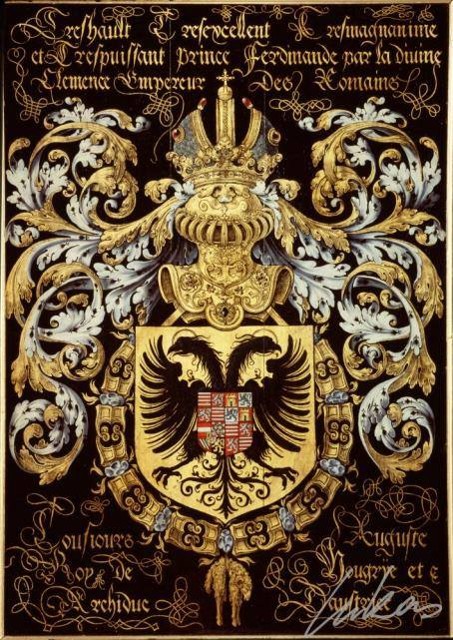
|
Imperial Vicar of the HRE - Reichsvikar An Imperial Vicar (German: Reichsvikar) was a prince charged with administering all or part of the Holy Roman Empire on behalf of the emperor. Later, an imperial vicar was invariably one of two princes charged by the Golden Bull with administering the Holy Roman Empire during an interregnum. The Holy Roman Empire was an elective monarchy, not a hereditary one. When an emperor died, if a king of the Romans had not already been elected, there would be no new emperor for a matter of several months until all the electors, or their representatives, could assemble for a new imperial election. During that time, imperial institutions still required oversight. This was performed by two imperial vicars. Each vicar, in the words of the Golden Bull, was "the administrator of the empire itself, with the power of passing judgments, of presenting to ecclesiastical benefices, of collecting returns and revenues and investing with fiefs, of receiving oaths of fealty for and in the name of the holy empire". All acts of the vicars were subject to ratification by the elected king or emperor. On many occasions, however, there was no interregnum, as a new king had been elected during the lifetime of his predecessor. The vicariate came to be associated with two counts palatinate: the duke and elector of Saxony (who also held the position of count palatine of Saxony) was vicar in areas operating under Saxon law (Saxony, Westphalia, Hanover, and northern Germany); the count palatine of the Rhine, also an elector, was vicar in the remainder of the Empire (Franconia, Swabia, the Rhine, and southern Germany). The Golden Bull of 1356 confirmed the position of the two electors. Disputes over the Palatine electorate from 1648 to 1777 led to confusion about who the rightful vicar was. In 1623, the Palatine Electorate was transferred to the duke (and thenceforth elector) of Bavaria. However, in 1648 a new electorate was created for the restored Count Palatine of the Rhine, which led to disputes between the two as to which was vicar. In 1657, both purported to act as vicar, but the Saxon vicar recognised the elector of Bavaria. In 1711, while the elector of Bavaria was under the ban of the Empire, the elector palatine again acted as vicar, but his cousin was restored to his position upon his restoration three years later. In 1724, the two electors made a pact to act as joint vicars, but the Imperial Diet rejected the agreement. Finally, in 1745, the two agreed to alternate as vicar, with Bavaria starting first. This arrangement was upheld by the Imperial Diet at Regensburg in 1752. In 1777 the question became moot when the elector palatine inherited Bavaria. In 1806, Emperor Francis II abdicated the imperial throne and also declared the dissolution of the Holy Roman Empire itself in the wake of defeats by France and the defection of much of southern and western Germany from the Empire to join the new Confederation of the Rhine. His decision to declare the dissolution of the Empire as well as to abdicate was apparently partially designed to forestall an interregnum with rule by the imperial vicars, which he feared might result in the election of Napoleon as Emperor. It should be noted that Francis II's abdiction is not a legal instrument to bring about the end of the Empire, (example can be given in the case of the abdication of Charles V), when a Holy Roman Emperor abdicates the Imperial Office, the Empire automatically goes into a state of interregnum, furthermore Francis II had no legal right in Imperial Law to either declare a dissolution of the Empire in part or whole, or infact to declare the renunciation of the oaths of allegiance by the Imperial States of the Empire, by doing this he broke his own Imperial Oath of Office through his decree of dissolution, his decree can and should be considered as void of legal status, breaking the oath of the Imperial office was a serious breach of the office of Emperor (some would say a treasonous action by the Emperor) and should be considered as an illegal act, furthermore Francis II did not consult in a proper manner with the Imperial Diet, Imperial Chamber Court or infact the Aulic Council and he never held their unanimous support or a rattified decision of the decree of dissolution by the aforementioned Imperial Bodies of the Empire, many Imperial States of the Empire where not informed directly and learnt after the fact, thus it should be concluded that the Holy Roman Empire has been in a state of full Interregnum since the 6th of August 1806 to the present day.
Present Imperial Vicar of the HRE Imperial Gazette Announcement - 24th May, 2023 - Aulic Council of the Holy Roman Empire - Consilium Aulicum - Reichshofrat - HREA - The President of the Aulic Council of the Holy Roman Empire and Chancellor of the HREA has been formally elected by the Vice-President and Vice-Chancellor of the Aulic Council, and the 18 Councillors of the Empire to the Imperial Office, Title and Rank of Imperial Vicar - Reichsvikar of the Holy Roman Empire, in this Two Hundred and Sixteenth year of the Interregnum of the Holy Roman Empire and the Imperial Crown, from the 6th of August 1806 to the present day, being confirmed in a meeting of the Aulic Council held today, on the 24th May In the Year of Our Lord Two Thousand and Twenty Three, In the presence of the aforesaid Vice-President, a Vice-Chancellor, and the 18 Councillors of the Empire, in the Imperial Eternal City of Rome, being signed and dated under the Imperial Seal of the Holy Roman Empire. “Christus vincit! Christus regnat! Christus imperat!” – “Christ conquers, Christ reigns, Christ commands” Contact: Imperial Vicar of the HRE: contact@holyromanempireassociation.org +
|





